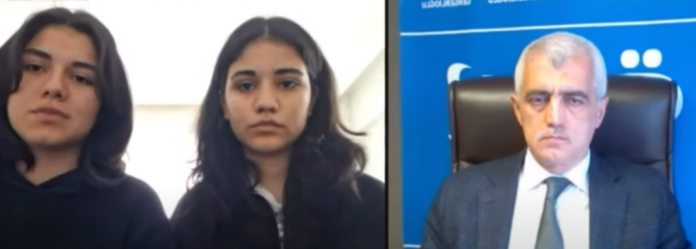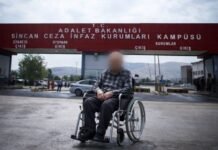Two teenage girls detained last week in a police operation focused on alleged members of Gülen movement, a faith-based group targeted by Turkish President Recep Tayyip Erdoğan and his ruling Justice and Development Party (AKP) for over a decade, recounted their traumatic experiences during a live broadcast on Tuesday, reporting psychological abuse and rights violations during their time in custody, Turkish Minute reported.
Zülal and Zümra Bayram, aged 17 and 15, were among 38 people detained on May 7, including 14 minors, as part of a wider crackdown by Turkish authorities.
The girls described their harrowing experience in a live broadcast on Twitter with pro-Kurdish Peoples’ Equality and Democracy Party (DEM Party) deputy Ömer Faruk Gergerlioğlu. They said the police raided their home at dawn, took them to the juvenile unit at İstanbul’s Üsküdar police station, while keeping their mother and elder sister with other adult detainees.
“They insulted our mother and threatened us,” reports Zülal. “We were held for 16 hours without explanation.”
Both teenagers said they were denied access to legal representation and interrogated without a lawyer. They say their statements were distorted and that they were not allowed to communicate with their families. She described a particularly disturbing interaction with a female officer who told them, “You’ll see what it’s like inside, they’ll make you suffer.”
To make matters worse, the detained siblings were forced to go hungry and thirsty for hours as the authorities initially denied them the food and water their families had brought. Zülal pointed out the psychological pressure they were subjected to, including constant insults and intimidation from the officers.
“You are a coward, you seem stressed, you are afraid of me because you are a liar,” one officer told her.
The raids have been criticized for their arbitrary nature and for targeting young female students. The detainees, accused of having links to the Gülen movement, included middle school, high school and university students.
The siblings claimed that children younger than them were also mistreated while being detained at the police station. After their release, their mother, who suffers from cirrhosis of the liver as well as Parkinson’s disease, was arrested. Concerns over her health have added to the family’s distress. “My mother needs her medication and cannot be subjected to stress,” Zümra said.
The sisters say they are currently unable to contact or send clothes to their mother and elder sister, who are currently being held in Bakırköy Women’s Prison.
The ordeal has traumatized the sisters, who fear further police action and are worried about the welfare and future of their mother and sister. They asked human rights organizations for support and stressed the importance of protecting children’s rights.
Gergerlioğlu has called on Interior Minister Ali Yerlikaya to address the reported abuses.
“There have been numerous violations of law against the children at the police station,” Gergerlioğlu stated. “Their statements were distorted, they were mistreated, shouted at, and subjected to psychological violence.”
Turkish President Recep Tayyip Erdoğan has been targeting followers of the Gülen movement, inspired by Muslim cleric Fethullah Gülen, since the corruption investigations of December 17-25, 2013, which implicated then-prime minister Erdoğan, his family members and his inner circle.
Dismissing the investigations as a Gülenist coup and conspiracy against his government, Erdoğan designated the movement as a terrorist organization and began to target its members. He intensified the crackdown on the movement following an abortive putsch that he accused Gülen of masterminding. Gülen and the movement strongly deny involvement in the coup attempt or any terrorist activity.
The İstanbul Public Prosecutor’s Office had issued detention warrants for the minors on allegations of “disseminating terrorist propaganda.”
Human rights advocates have condemned the operation, citing violations of both Turkish and international law.
Eren Keskin, co-chair of the Human Rights Association (İHD), said the treatment of the teenagers violated the UN Convention on the Rights of the Child. “The children were frightened and left hungry for hours,” Keskin said. “This is a clear human rights violation.”
Juvenile detention in Turkey
The treatment of minors in Turkish detention centers has been a longstanding issue. A report by Gülizar Biçer Karaca from the Republican People’s Party (CHP), titled “Children’s Prison,” highlighted significant concerns about the conditions in juvenile detention centers. According to the report, nearly half of the 30,000 minors convicted in 2022 were incarcerated, while 15,407 were released under judicial supervision. The report noted that 5,601 minors were still of school age and would continue their education in juvenile facilities.
Human rights advocates have repeatedly criticized the conditions in these centers, citing instances of ill-treatment, violence and torture. The report emphasized that juvenile detention centers are not equipped to meet the psychological and physical needs of youngsters. Between 2013 and 2017, 13 minors died in juvenile detention centers, with at least six of those deaths being suicides.
Violating Turkish and international law
According to the Brussels-based human rights organization Solidarity with Others, the recent police operation violates several national and international laws, including the UN Convention on the Rights of the Child, the International Covenant on Civil and Political Rights, and the European Convention on Human Rights.
The specific violations cited by Solidarity with Others, which drafted a report on the matter, include arbitrary detentions under false charges, which violate Article 19 of the Turkish Constitution and Article 5 of the European Convention on Human Rights (ECHR).
The lack of legal grounds for accusations contravenes the right to a fair trial as enshrined in Article 6 of the ECHR and Article 40(2)(a) of the UN Convention on the Rights of the Child (UNCRC), the organization points out.
Additionally, arbitrary surveillance and detention infringe upon the right to respect for private and family life, violating Articles 17 and 41 of the constitution and Article 8 of the ECHR.
The detention conditions, which might have caused physical and psychological harm to the detainees, contravene the prohibition of torture and inhumane treatment under Article 3 of the ECHR and Article 37 of the UNCRC, the Brussel-based rights group underlines.
Moreover, the disruption of children’s education breaches their right to education, protected by Article 42 of the constitution and Article 28 of the UNCRC.
Zümra and Zülal’s ordeal highlights a wider pattern of rights abuses in Turkey, where thousands, including journalists, academics and activists, have been imprisoned on terrorism charges. Human rights organizations continue to call for international attention to the situation and for reforms to protect basic freedoms in the country.















